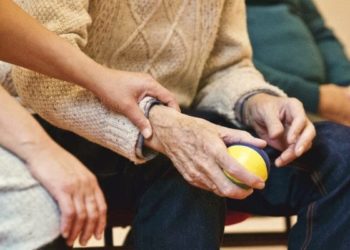2 Minute Medicine Rewind January 29, 2018
Trial of Solanezumab for Mild Dementia Due to Alzheimer’s Disease
Alzheimer’s disease (AD) is a progressive disease with lasting impacts on memory and other cognitive functions. Its neuropathological hallmarks include extracellular plaques containing amyloid, as well as beta and neurofibrillary tangles containing hyperphosphorylated tau protein. At this time, there are no FDA-approved pharmacotherapies for AD. Solanezumab is a humanized immunoglobulin G1 monoclonal antibody that binds to the mid-domain of the AB peptide to increase clearance of AB from the brain. In this double-blind, placebo-controlled phase 3 trial, 2129 patients with dementia due to AD were randomly assigned to receive 400 mg solanezumab or placebo intravenously every 4 weeks for 76 weeks to investigate the efficacy of solanezumab with respect to cognitive outcomes. Patients were followed up for change from baseline up to week 80 based on the 14-item cognitive subscale of the AD Assessment Scale (ADAS-cog14). Score. Researchers found that the mean change from baseline in the ADAS-cog14 score was 6.65 in the solanezumab group and 7.44 in the placebo group, with no significant between group difference at week 80 (RR -0.80, 95% CI -1.73 to 0.14, p=0.10). This study therefore shows that solanezumab administered at 400 mg every 4 weeks in patients with mild AD does not significantly affect cognitive decline.
Glecaprevir–Pibrentasvir for 8 or 12 Weeks in HCV Genotype 1 or 3 Infection
Hepatitis C virus (HCV) genotypes 1 and 3 are together responsible for approximately 70% of an estimated 71 to 80 million HCV infections worldwide. While most treatments for HCV are administered over approximately 12 weeks, patient adherence in the last 4 weeks of treatment is often an issue; a shorter treatment duration may improve adherence rates. This phase 3, randomized controlled trial enrolled 1208 patients with genotype 1 or 3 HCV infection. Patients with genotype 1 were randomly assigned in a 1:1 ratio to receive once daily glecaprevir-pibrentasvir for either 8 or 12 weeks. Patients with genotype 3 were randomly assigned in a 2:1 ratio to receive 12 weeks of treatment with either glecaprevir-pibrentasvir or sofosbuvir-daclatasvir. Patients were followed for rate of sustained virologic response 12 weeks after the end of treatment. Researchers found that the rate of sustained virologic response at 12 weeks among genotype 1-infected patients was 99.1% (95% CI 98% to 100%) in the 8-week group and 99.7% (95% CI 99% to 100%) in the 12-week group. Genotype 3-infected patients who were treated for 12 weeks had a rate of sustained virologic response at 12 weeks of 95% (95% CI 93% to 98%) with glecaprevir–pibrentasvir and 97% (95% CI 93% to 99.9%) with sofosbuvir–daclatasvir. Genotype 3-infected patients that received8 weeks of treatment with glecaprevir–pibrentasvir yielded a response rate of 95% (95% CI 91% to 98%). Adverse events led to discontinuation of treatment in no more than 1% of patients in any treatment group. Researchers therefore concluded that once-daily treatment with glecaprevir–pibrentasvir for either 8 weeks or 12 weeks achieved high rates of sustained virologic response among patients with HCV genotype 1 or 3 infection without cirrhosis.
Non-vitamin K antagonist oral anticoagulants (NOACs) are increasingly used as alternatives to warfarin in preventing thromboembolic complications in high-risk patients with atrial fibrillation. The association between preceding oral use of NOACS and in-hospital mortality among patients with intracerebral hemorrhage (ICH), however, has not been well studied. In this retrospective cohort study, 141,311 patients with ICH admitted from October 2013 to December 2016 were followed up for in-hospital mortality. Researchers found that acute ICH stroke severity, as measured by the National Institutes of Health Stroke Scale, was not significantly different across the 3 treatment groups studied: 9 (interquartile range (IQR) 2 to 21) for warfarin, 8 (IQR 2 to 20) for NOACs, and 8 (IQR 2 to 19] for no OACs). Prior use of warfarin compared to no prior anticoagulant use was associated with higher in-hospital mortality (adjusted risk difference (ARD) 9.0%, 97.5% CI 7.9% to 10.1%; OR 1.62, 97.5% CI 1.53 to 1.71). Prior use of NOACs, compared with no prior anticoagulant use, was associated with higher in-hospital mortality (ARD 3.3%, 97.5% CI 1.7% to 4.8%; OR 1.21, 97.5% CI 1.11 to 1.32). Prior use of NOACs, compared with warfarin, was associated with lower in-hospital mortality risk (ARD -5.7%, 97.5% CI -7.3% to -4.2%; OR 0.75, 97.5% CI 0.69 to 0.81). Investigators therefore concluded that among patients with ICH, prior use of NOACs, compared with prior use of warfarin, was associated with lower risk of in-hospital mortality.
Patients with Lennox-Gastaut syndrome, a rare, severe form of epileptic encephalopathy, are frequently treatment-resistant to available medications. No controlled studies have investigated the use of cannabidiol for patients with seizures in the context of Lennox-Gastaut syndrome. In this multicenter randomized controlled trial, 171 patients with treatment-resistant Lennox-Gastaut syndrome were randomly assigned to receive cannabidiol or placebo to investigate the efficacy of cannabidiol as an add-on therapy for seizures. Patients were followed up for percentage change from baseline in monthly frequency of drop seizures during the treatment period. Researchers found that the medial percentage reduction in monthly drop seizure frequency from baseline was 43.9% (IQR -69.6 to -1.9) in the cannabidiol group and 21.8% (IQR -45.7 to 1.7) in the placebo group. The estimated median difference between the treatment groups was -17·21 (95% CI -30.32 to -4.09, p=0.0135) during the 14-week treatment period. Adverse events occurred in 74 (86%) of 86 patients in the cannabidiol group and 59 (69%) of 85 patients in the placebo group, the majority of which were mild or moderate. Investigators therefore concluded that add-on cannabidiol is efficacious in the treatment of patients with drop seizures associated with Lennox-Gastaut syndrome and is generally well-tolerated. However, further studies are required in evaluating the long-term efficacy and safety of cannabidiol.
Upper abdominal surgery is the most frequent major surgical procedure performed in developed countries, with postoperative pulmonary complications (PPC) being the most common serious complication after this type of surgery. Preoperative education and breathing exercise training alone is reported to be associated with large relative risk reduction and absolute risk reduction in PPCs, although this effect could be exaggerated by methodological biases of single center trials, non-masked assessors, and low risk surgical cohorts. In this randomized controlled superiority trial, 441 patients were randomized to receive either an information booklet or preoperative physiotherapy for patients who were within six weeks of elective major open upper abdominal surgery. Patients were followed up for 12 months for PPC within 14 postoperative hospital days assessed daily using the Melbourne group score. Researchers found that the incidence of PPCs within 14 postoperative hospital days, including hospital acquired pneumonia, was halved with an adjusted hazard ratio of 0.48 (95% CI 0.30 to 0.75, p=0.001) in the intervention group compared to the control group, and with an absolute risk reduction of 15% (95% CI 7% to 22%). No significant differences in other secondary outcomes were detected. Investigators therefore concluded that a 30-minute preoperative physiotherapy session significantly the incidence of PPCs in patients undergoing elective upper abdominal surgery.
Image: PD
©2018 2 Minute Medicine, Inc. All rights reserved. No works may be reproduced without expressed written consent from 2 Minute Medicine, Inc. Inquire about licensing here. No article should be construed as medical advice and is not intended as such by the authors or by 2 Minute Medicine, Inc.







